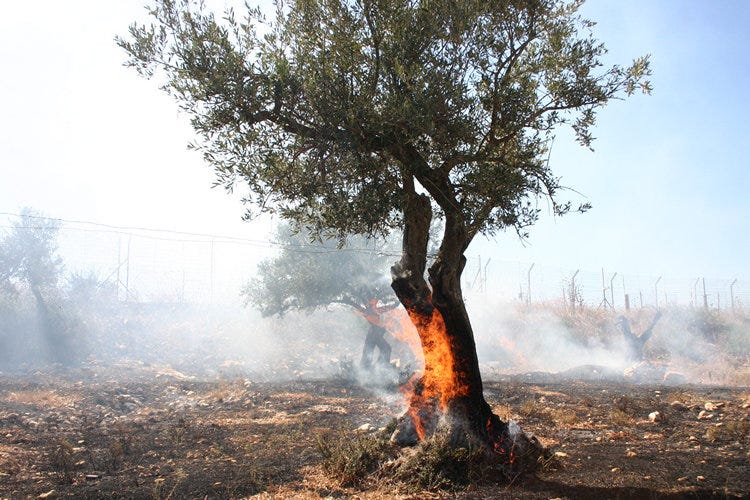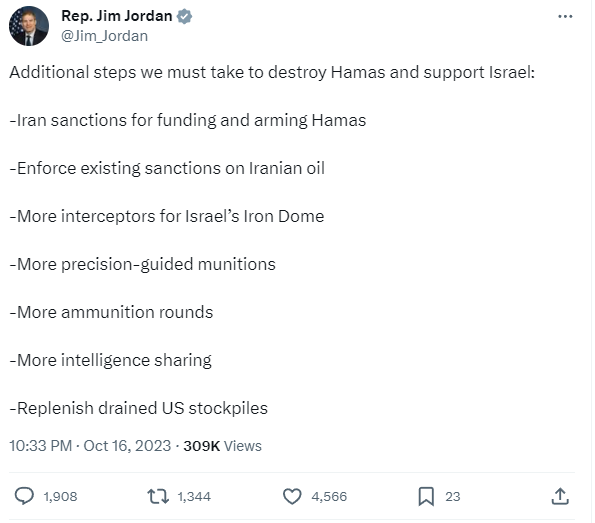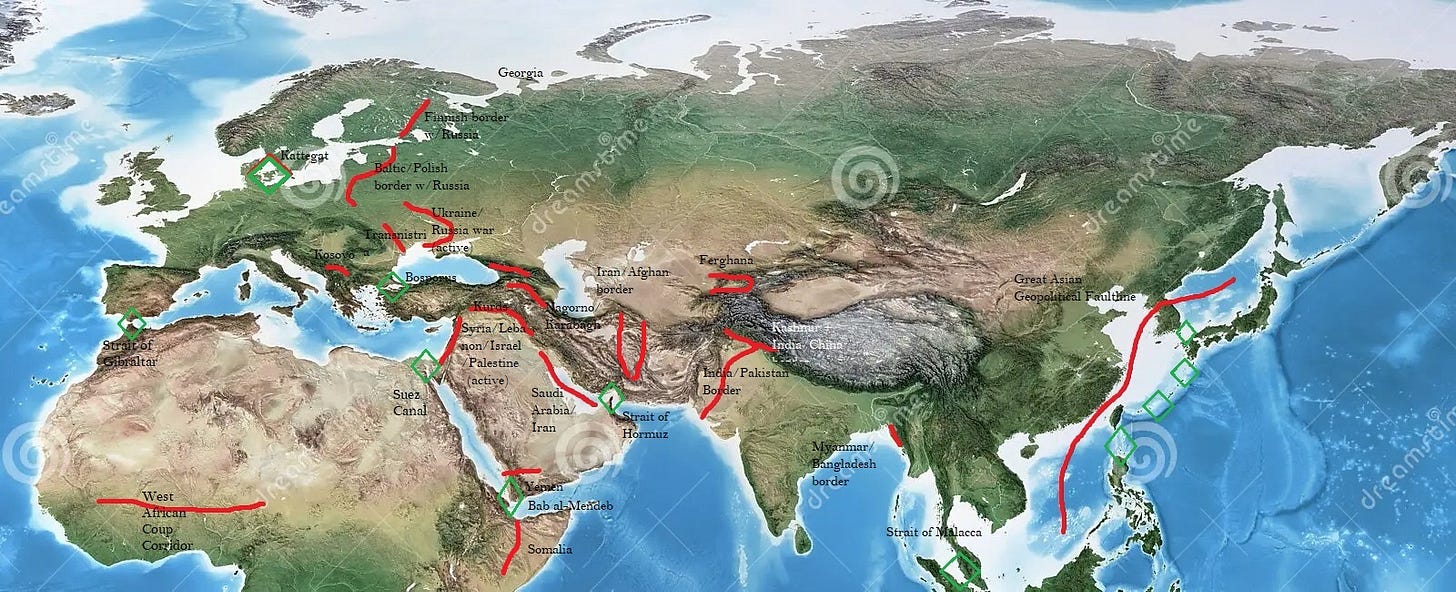Israel and Palestine: Burning the Olive Branch
A conflict long in the making risks going global
The symbolic olive tree is distinctly burning in the current conflict.
As of this writing, it’s been ten days since the brutal Hamas attacks on southern Israel. In those short ten days, the odds of this conflict spiraling out of control have increased steadily and alarmingly. The situation is dark, with even darker and more ominous storm clouds on the horizon.
From this viewpoint, I don’t see a way out of this conflict going global. I’d love to paint an optimistic picture or find some silver lining here — but I can’t. If I’m forced to look for any good news, it’s this: If you were worried about World War 3 starting, you don’t need to worry anymore. It already has.
This is just another front opening. A broad Middle East conflict centering on Israel has been due for two achingly simple and yet agonizingly complex reasons:
The borders in the Middle East make no sense (more on that later), and
American power is waning in the Middle East
Hamas brutally attacked Israeli civilians specifically to engender the reaction that we’re witnessing right now. In radical circles, provoking a reaction is often the most important result of any action. The goal here clearly is to elevate international ire against Israel and draw sympathy for Palestine, all while using civilians as meat shields. It’s twisted as it gets, but it’s hard to argue that the tactic is ineffective. Other countries are already getting involved.
To be clear, I’m on the side of peace. I unfortunately think peace will be in short supply starting now. I understand a country has a right to defend itself. I also understand the situation has been a mess for decades.
I’ll assume readers have some background understanding of what’s happened in recent days as well as the long-term situation. As it stands, Gazans have been ordered to evacuate the northern half of the strip in preparation for an Israeli ground invasion of the north end of the Strip. Israel has bombed much of the Strip to rubble, killing who knows how many civilians in the process. As an American who remembers 9/11 well, I know the anger generated by an attack like the one Hamas committed can be overwhelming. The propaganda can be, too.
Information coming out of Gaza is currently spotty because both the internet and electricity have been cut off by Israel, which itself is a brutal act. So, we don’t really know what’s going on inside Gaza at the moment. The promised ground invasion has not yet begun. President Biden will be flying to Israel to talk with Prime Minister Netanyahu on Wednesday — not that we can expect much of him.
The most significant development of the last few days is that clashes have erupted on the Israel-Lebanon border between Israel Defense Forces (IDF) and Hezbollah. As a direct proxy of Iran, you can be certain that any fighting between Hezbollah and Israel has been at minimum blessed by Iran. Just hours before this post, Hezbollah confirmed it inflicted casualties on the IDF, and the IDF has similarly shot at Hezbollah (sources are in Arabic, will update later). Border towns have been evacuated. So, here we go.
CRITICAL UPDATE: On Oct 17, the Al-Ahli hospital in Gaza has been bombed, with hundreds of civilians dead. Many accuse Israel of bombing the hospital. Israel is blaming Islamic Jihad. President Biden’s meeting with Arab leaders has been cancelled following the blast. It’s currently unclear who is responsible, but it was a very large blast. This is a major escalation.
Iran looms large in this conflict. It has made vague and ominous threats to Israel should it send ground troops into Gaza. President Biden himself said occupying Gaza would be a big mistake. If Israel does go in, as it seems most likely to do, it would be a bloody and brutal affair.
As we’ve recently seen in Bakhmut, urban fighting in concrete ruins is about as messy as fighting gets. An invasion of Gaza won’t be any Stalingrad, since Hamas is heavily outgunned by Israel, but you can be sure the home ground advantage will favor them, as the area can be boobytrapped and is crisscrossed by tunnels.
Infinity Order Consequences
The Al-Aqsa Mosque represents far more than just a religion.
But then what? What happens if and when Israel takes the north half of Gaza? Invasion and occupation are two different things. Destroying and then occupying the territory will only create more hatred towards Israel from both Palestinians and those sympathetic to Palestine.
That, of course, is the whole point, and why Hamas attacked the way they did in the first place.
So, here we are:
One US Aircraft Carrier Group (the USS Gerald R. Ford) is stationed off the coast of Israel, and another (the USS Dwight D. Eisenhower) is on the way. That’s serious firepower
A contingent of 2,000 US Marines has been deployed to the coast as well
Israel has not yet sent ground troops into Gaza, but may at any moment
Israel has cut off electricity in Gaza, though water has allegedly been restored. Some humanitarian aid may come through
The Rafah border crossing has been bombed by Israel and is confusingly blocked to refugees entering Egypt
Clashes are flaring between Israel and Hezbollah
Iranian-backed militias have stated they will attack US targets should the US attack Gaza
Hezbollah has stated it will attack Israel should Israel invade Gaza
The whole thing is a fucking mess and I need a strong drink
Regarding the initial attacks themselves, there are only two possible scenarios I see to be likely:
The attacks constitute a colossal failure on the part of Mossad, Israel’s intelligence service, even in the face of warnings from Egypt. Gaza is one of the most heavily surveilled places on Earth and Mossad has all the toys and money in the world at its disposal
The attacks were allowed to happen
Either way, Benjamin Netanyahu’s government failed spectacularly. The conspiracy-minded might argue that neocon chickenhawks in Washington and Israel alike have been spoiling for a fight with Iran for decades while Israel has sought a permanent solution to the Palestinian question, and this represents a good pretext. I don’t pretend to know the answer, but we have to consider all possibilities. It would not be the first time a casus belli was drummed up to the detriment of a country’s own citizens.
US Sentiment towards the War
Of course, official US sentiment supports Israel unequivocally. Likely House Speaker Jim Jordan recently tweeted this:
So, can we expect peace out of Congress? Don’t be silly. The US government doesn’t “do” peace. To illustrate this point, our illustrious President (I vomited a little) declared the US the most powerful country in the world, and thus of course we could support both a war in Israel as well as one in Ukraine.
Our equally illustrious Treasury Secretary, who notably lied that inflation would be “transitory” back in 2021, thinks the US economy is doing great and we’ll have no problem footing the bill for two wars as well.
Meanwhile, I can tell you with a fair bit of certainty that most Americans are sick of foreign wars. Ask around! Take your own survey. Inflation is crushing people, our debt is out of control, and an economic downturn — to put it lightly — is certain.
But the people in Washington don’t give a damn about you or me and definitely not someone real on the other side of the world. This Israel thing could be chump change compared to the wars against Russia and China they’re planning for. More on that in a later post. My gears are grinding a bit, if you can’t tell. As a spoiler, there’s serious talk of reinstituting a draft and expectations of 3600 casualties a day in a theoretical upcoming major conflict.
Enter the Rabbit Hole
Israeli citizens celebrate the state’s inauguration in 1948.
There’s an excellent 1989 book describing the origin of the current Middle East borders called A Peace to End All Peace. I’d love to do a deep dive on it another time, but I need to keep this post brief because the current nasty situation is evolving so rapidly. As a very brief summary: The dissolution of the Ottoman Empire resulted in nation-states that have been viewed by many of their own citizens, for the last century, as illegitimate. As the author, David Fromkin, points out, “The Middle East became what it is today because the European powers undertook to re-shape it and because Britain and France failed to ensure that the dynasties, the states, and the political system they established would permanently endure.”
The Settlement of 1922 — in which the Ottoman Empire was partitioned between Turkey and an exhausted Britain and France was fraught enough. Throw in the creation of a Jewish Israel some two and a half decades later, and a tinder box for the ages was created.
You’ll commonly hear the argument that modern borders in the Middle East are artificial. That’s partly true. The real problem is that the geography of the Middle East lends itself to the idea of Empire, since there are few natural borders in the region to be had at all. This has been proven time and time again since the Bronze Age: The area, under normal circumstances, unifies under central rule. The Middle East is the birthplace of Empire itself.
Israel’s existence throws a monkey wrench into the traditional geopolitical workings of the Middle East. If you were to say it was put there on purpose to prevent another Ottoman Empire, a Caliphate, or some modern version of the Assyrian Empire from arising, you might be onto something. Israel could only have been created in serious geopolitical turmoil, like the map redrawing that followed each World War. Now, some 100 years after the final dissolution of the Ottoman Empire, the Ghost of Empire has come knocking again.
Global Implications
Red: Geopolitical fault line. Green: Geopolitical choke point.
That the pushback against the US-led “rules-based international order” comes after the disastrous US withdrawal in Afghanistan is no accident. The US has demonstrated serious weakness internationally, and is currently led by a bumbling and quite clearly corrupt set of fools. US debt is spiraling out of control. What better time to dismantle the international order the US has ruled since the Second World War, and especially since the fall of the USSR?
It’s at this point we have to look where the conflict could spread next. After all, in recent times we’ve seen a Russian war against the US-backed Ukraine, coups against French-backed governments in West Africa, and a geopolitically surging China garnering support on nearly every continent.
Eurasia itself is the biggest tinderbox. It’s also the biggest prize.
For readers’ convenience, I’ve created a map of geopolitical fault lines and chokepoints above for readers to ponder. Due to the fact that my artistic and graphic design skills are stuck in the Pleistocene, the lines are not exact but they should give you a good indication of where we can look next for upcoming conflicts. Because you can be certain of one thing: This conflict is going global, and it’s just getting started. If I’m wrong, then I’ll thank whatever God you like.







Ah s**t, here we go again. Honestly, we could use a longer respite here in Russia. I sincerely hope we’ll fare better this time, because first war cost us our state (and we are kinda yet to restore it) and the second took so many lives.